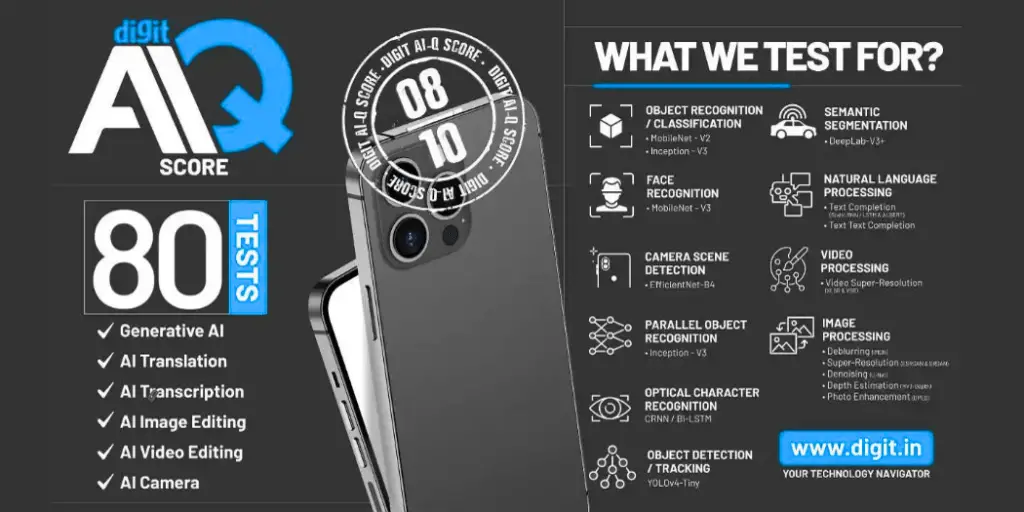Artificial Intelligence has rapidly transitioned from a futuristic concept to an essential part of our daily lives, significantly enhancing our interactions with technology.
From improving photography to enabling sophisticated voice assistants and powering predictive text, AI capabilities are increasingly shaping the user experience in smartphones.
Recognizing the growing importance of AI in consumer electronics, Digit has developed the Digit AI-Q scoring system, a pioneering method for evaluating AI performance in various devices.
This innovation marks the first standardized measure of AI performance in the publishing industry, setting a new benchmark for understanding and comparing AI capabilities in consumer gadgets.
The Evolution of AI
AI’s journey from a futuristic idea to an integral component of consumer electronics has been remarkable. In smartphones, AI enhances photography by automatically adjusting settings for the best shot, powers voice assistants like Siri and Google Assistant, and improves predictive text for seamless communication.
These advancements have redefined user expectations and experiences, making AI a crucial factor in device performance.

As AI continues to evolve, its applications are expanding into other consumer electronics, including laptops and televisions, where it optimizes performance, personalizes content, and improves overall functionality.
This transformation underscores the importance of reliable metrics for evaluating AI capabilities, leading to the development of the Digit AI-Q scoring system.
Digit AI-Q Scoring System
The Digit AI-Q scoring system was created to address the need for a standardized method to evaluate AI performance in consumer electronics.
With the rise of AI’s role in enhancing device functionalities, it became essential to provide consumers with a clear understanding of AI capabilities in their gadgets.
The AI-Q score was developed through extensive research and testing, involving 80 AI and Computer Vision tests conducted on the Neural Processing Unit of devices.
This innovative scoring system marks a significant milestone in the publishing industry, offering the first standardized measure of AI performance.
The AI-Q score helps users make informed decisions by providing a comprehensive evaluation of a device’s AI capabilities.
The rigorous testing process examines various aspects of AI performance, including speed, accuracy, and initialization time, ensuring a thorough and reliable assessment.
Digit’s strategic growth initiatives, including its recent acquisition by Times Network, have bolstered its commitment to advancing digital publishing and technology evaluation.
With the AI-Q scoring system, Digit not only empowers consumers with valuable insights but also showcases its thought leadership in the technology industry.
This standardized measure sets a new benchmark for evaluating AI performance, reflecting the growing significance of AI in consumer electronics.
Components of the Digit AI-Q Score
The Digit AI-Q score is a proprietary system designed to evaluate the AI capabilities of various consumer electronic devices, including smartphones, laptops, and televisions.
This scoring system is based on a comprehensive testing process that covers multiple dimensions of AI performance.
The AI-Q score is derived from 80 AI and Computer Vision tests conducted on the Neural Processing Unit of devices. These tests are designed to assess a wide range of AI functionalities, ensuring a thorough evaluation.
Key aspects evaluated include object recognition/classification, which tests how well the device can identify and categorize objects within images, and semantic segmentation, which assesses the device’s ability to segment and label different parts of an image.
Parallel object recognition assesses the device’s capability to recognize multiple objects simultaneously. In contrast, optical character recognition measures the accuracy and speed of text recognition from images.
Object tracking evaluates the device’s ability to follow moving objects within a video, and image and video processing tests the quality and efficiency of image and video enhancement features.
Face recognition assesses the accuracy and reliability of facial identification and verification, camera scene detection evaluates how well the device can identify and optimize various scene settings in photography, and natural language processing measures the device’s ability to understand and process human language.
The benchmarking process examines over 180 different aspects of AI performance. Key performance indicators include speed, accuracy, and initialization time, providing a comprehensive and holistic evaluation.
By evaluating these components, the Digit AI-Q score offers a clear and detailed understanding of a device’s AI capabilities, helping consumers make informed decisions and understand the true potential of their gadgets.
Benchmarking Process
The Digit AI-Q scoring system employs a rigorous benchmarking process to ensure a comprehensive and reliable evaluation of AI performance in consumer electronic devices. This process involves multiple stages of testing and analysis, focusing on critical aspects of AI functionality.
The process begins with testing 80 different AI and Computer Vision models on the Neural Processing Unit of devices. These models are selected to cover a broad spectrum of AI capabilities and applications.
The benchmarking process examines over 180 distinct aspects of AI performance, including speed, accuracy, and initialization time.

Speed measures how quickly the AI functions are executed, accuracy assesses the precision of AI tasks such as object recognition and natural language processing, and initialization time evaluates the time it takes for AI functions to start and operate efficiently.
Specific tests conducted during the benchmarking process include object recognition/classification, which tests how accurately and quickly the device can identify and classify various objects, and semantic segmentation, which evaluates the device’s ability to differentiate and label different segments within an image.
Parallel object recognition assesses the performance when recognizing multiple objects simultaneously. In contrast, optical character recognition measures the accuracy and efficiency of text extraction from images.
Object tracking evaluates the device’s capability to follow moving objects in real time, and image and video processing tests the quality and speed of processing enhancements for images and videos.
Face recognition assesses the accuracy and reliability of facial identification and verification processes, camera scene detection evaluates how well the device can detect and optimize various scenes for photography, and natural language processing measures the device’s ability to understand and process human language effectively.
Each device undergoes a thorough analysis to determine its overall AI performance. The results from various tests are aggregated to form a single AI-Q score, providing a holistic view of the device’s AI capabilities.
By following this meticulous benchmarking process, the Digit AI-Q scoring system ensures that consumers receive an accurate and detailed evaluation of AI performance in their devices, empowering them to make informed purchasing decisions.
Introduction of Digit-AI-zed
As part of our ongoing commitment to empower consumers with the latest information, we have introduced Digit-AI-zed, a new segment on our website dedicated to AI-related news and reviews.
This section serves as a comprehensive source of information for both users and industry leaders seeking the latest advancements in AI technology.
Digit-AI-zed aims to provide in-depth coverage of AI developments, featuring detailed reviews, expert analyses, and the latest news on AI innovations.
By offering a centralized hub for all things AI, Digit-AI-zed helps users stay informed about the rapidly evolving AI landscape, understand the capabilities of various AI technologies, and make well-informed decisions about their tech purchases.

Through Digit-AI-zed, we strive to bridge the knowledge gap and foster a deeper understanding of AI among our audience. This initiative not only supports consumers in navigating the complex world of AI but also underscores Digit’s role as a thought leader in the technology industry.
By providing accurate and timely information, Digit-AI-zed enhances the overall user experience and contributes to the growing discourse on AI technology.
The Digit AI-Q scoring system represents a significant advancement in evaluating AI performance in consumer electronics. By offering a standardized measure, it empowers consumers to make informed decisions based on comprehensive and reliable AI performance metrics.
The introduction of Digit-AI-zed further supports this mission by providing a dedicated platform for the latest AI news and reviews, solidifying Digit’s role as a leader in technology evaluation and information.


